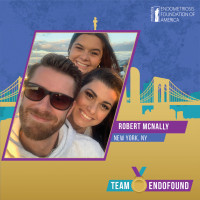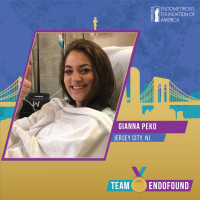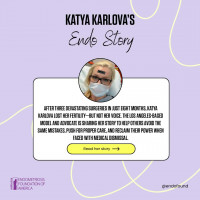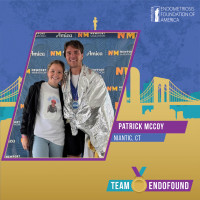
My name is Tabitha Frank, and I was diagnosed with endosalpingiosis in 2014, not long as I gave birth to my son. I was in my early twenties when I started experiencing pelvic pain. I had my left ovary and fallopian tube removed in the same year. I was in and out of doctor’s offices and hospitals trying to understand what my body was going through, and due to complications from surgeries, I unfortunately lost my left kidney. My pain did not improve, nor did my goal to receive the medical answers I needed. In 2013, I gave birth to my miracle child, after years of trying to conceive and experiencing countless miscarriages. When I had my tubes tied shortly after the birth of my son, my doctor discovered that I have endosalpingiosis. The diagnosis was a big relief for me; finally, I knew why I was in so much pain for so many years.
I had never heard of this disease and neither had the gynecologist who had performed my surgery and delivered my son. He spent almost a month after my surgery looking for information on this disease. He came up with only an Internet search form he printed out and gave me. I couldn’t believe something that was causing me so many health issues didn’t have more information available. At the time, I didn’t realize how rare my form of this disease was—not until I started doing my own research and could only find a handful of articles on the subject. There are no doctors who specialize in endosalpingiosis, and no medical professionals who are currently doing any research on it. So, I decided to create a support group on Facebook to find other women who are going through the same thing as me. Within a few years, I founded the Endosalpingiosis Foundation.
Endosalpingiosis can be a painful reproductive condition. It is similar to endometriosis, but instead of endometrial-like tissue as occurs in endometriosis, tissue from the fallopian tubes is found outside of the tubes and elsewhere in the pelvic cavity, and may cause pain, infertility, both, or neither. To receive a diagnosis, you must undergo laparoscopic surgery and receive a pathology report. There is no cure, and no known treatment.
Symptomatic endosalpingiosis is a rare condition, seen mostly in age groups of 30–49 years, and could be a cause of abdominal pain. It affects all the organs in the abdomen and pelvis. Higher associations were found with ovarian cancer, endometriosis, and uterine cancer. There is no data on how many individuals have this disease, and there is currently little research being done to better understand the disease. [Editor’s Note: There were only 65 new references on endosalpingiosis in PubMed during the last 5 years compared with endometriosis at 6,351.]
Currently, there are over 200 members in the endosalpingiosis support group on Facebook. Most of these members are based in the United Kingdom or Australia. Most have been dealing with endosalpingiosis for years; some were just diagnosed. The age ranges from teenager to early fifties. These individuals are all struggling with additional diseases like endometriosis and other chronic pelvic pain, just to name a few. When I created this support group in 2018, I had the will to take on the world. I did not care what it cost me; I was going to make this disease known. I was most daunted by the fact that my doctors did not know how to help me and could not tell me if I was going to live the next five years or die tomorrow. I did not want anyone else to feel that way. I was trying so hard to be brave, not just for myself, but for all the individuals who were fighting the same fight as me. How could I comfort someone who was going through the same thing as me and tell them everything is going to be fine when I didn’t believe the words myself? So, I thought that if we all came together, we could find some answers. We could do this together. Support is moving forward in ways that I did not anticipate; I am meeting more women who want to do something about this disease.
One of the biggest issues that endosalpingiosis patients face is uncertainty about how it develops. Research articles support the theory that endosalpingiosis can be associated with late life genetic mutations. Some patients have more advanced cases than others. There are also articles that state that there is no information on how or why women have this disease. This is not helpful.
There are so many questions that endosalpingiosis patients do not have the answers to. Does this disease affect our fertility? Is this disease linked to cancer? Why do so many of us have other diseases, and is one of them causing endosalpingiosis? Or is it the other way around? Is endosalpingiosis making our bodies vulnerable to other diseases? These are just a few of the questions that our community continues to ask, with no answer.
Most people have never heard about this disease. Endosalpingiosis is so rare that there are only a handful of doctors that even know what it is. Women’s health issues are drastically underfunded, and it is imperative that endosalpingiosis patients have answers on questions such as whether this disease is fatal, leaves patients infertile, or can cause other diseases. disease be included.
My hope for this nonprofit is to fund researchers who will be working on finding a cure within my lifetime. We need to find a way to detect this disease without having to have surgery. We need every doctor to be medically educated on this disease. We need posters in doctor offices, brochures in the waiting room; we need to feel hope, instead of fear, shame, and confusion. We need to speak out about our bodies and how diseases like endosalpingiosis are affecting us. Our families are also coping alongside us, and we need support groups and other ways to help them cope. Everyone struggling with this disease needs access to mental health. We do not want anyone to feel so helpless that they take their own life. Mental health is a critical concern that needs to be taken seriously, especially when dealing with chronic disease.
If you cannot afford diagnostic surgery, the Endosalpingiosis Foundation will help pay for it with federal grants, personal donations, and our assistance program. We are here to help you and your family through our programs. No matter your income restrictions. The Endosalpingiosis Foundation will also have access to other state agencies to help you and your families. We want to do everything we can to help out—even if what you need is just someone to listen to your concerns.
My plans for the future of endosalpingiosis advocacy? I am speaking with members of congress and the senate to let them know we are here, and we need help. I aim to hold rallies in different states so we can stand and fight together. There is strength in numbers, and I believe our voice is not yet being represented. We can do the work that other diseases have done to get the word out. Our voices need to be heard in the medical community.
I will not stop working until we find a cure.
Learn more about endosalpingiosis at www.endosalfoundation.org.









